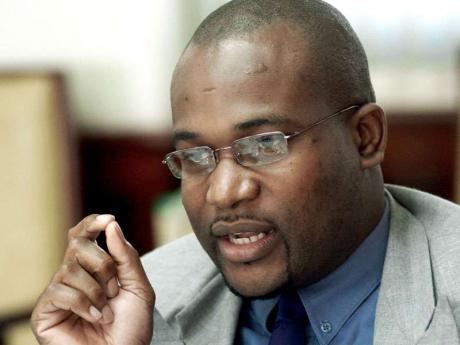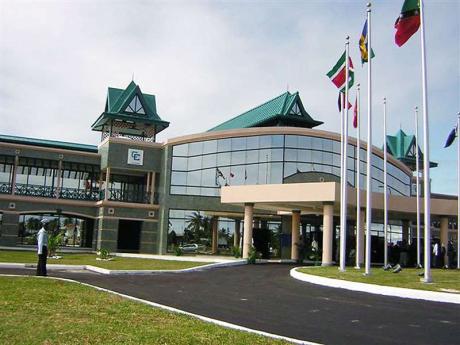New thinking needed to secure CARICOM's future
Densil A. Williams, Contributor
When the Treaty of Chaguaramas was signed more than three decades ago to establish the CARICOM integration movement, it was a defining moment in the history of the English-speaking Caribbean.
The size of the economies in the Commonwealth Caribbean is just too small for them to integrate in the global economy in any meaningful way as individual states. The general idea behind integration is for these small economies to come together as one bloc of states and better integrate into the global production system for goods and services in order to improve the well-being of their citizens.
The English-speaking Caribbean has fewer than 15 million people, and with the Dominican Republic and Haiti added, the figure moves closer to 24 million, with an aggregate gross domestic product of just over US$100 billion. Indeed, the population of Puerto Rico, a country in the northern Caribbean, is about four million and gross domestic product is around US$93 billion.
If the output from 16 countries is almost equal to that of one country, the logic is clear - the 16 will have no choice but to integrate or perish. None of the individual countries from the group of 16 will have the capacity to compete on its own. In this regard, conceptually, it makes economic sense for the countries of the Caribbean to integrate if they are to have any hope of survival in a most inhospitable global economic landscape. One would have thought that given the compelling data to support the need for the region to deepen its integration project, the project would have been further along the integration continuum, moving closer to a single economy.
Unfortunately, it appears that instead of a deepening of the integration movement in the Caribbean, the reverse is happening. There are serious questions being raised about the future of the regional integration project as the commitment from major actors in the project comes up for serious scrutiny. Commentators on CARICOM are worried about Jamaica and Trinidad, two of the movement's most developed countries (MDC), who have announced their intention to consider their own final court of appeal instead of using the established Caribbean Court of Justice (CCJ), which would signal a commitment to the regional project.
Also, the delay in naming a new secretary general after the departure of the long-standing former secretary general and committed regionalist, Sir Edwin Carrington, has raised even more questions about the seriousness which is attached to the regional project at a time when most regions in the global economy are moving swiftly to create integration zones to provide a training ground for integration into the global economy. This is evident from the Economic Community of West African States in the east to the North American Free Trade Agreement in the west. So, why does it appear that CARICOM is losing steam when other larger economies are deepening their integration agenda?
Weak foundation for integration
While differences in political ideology are contributing factors to the present crisis in which CARICOM finds itself entangled, I submit that the foundation for integration in the first instance was weak and, as such, when ideologies vary, there is nothing to anchor the movement. CARICOM's main objective from inception was to create a single Caribbean market for goods and services.
The movement actually began as a free-trade area with adjustments made to implement a common external tariff which shifted the free trade area to a customs union and, subsequently, more protocols have been signed to transform it into a common market and, eventually, an economic union. However, it has largely functioned as a trade zone since inception. The functioning as a trade zone has failed miserably, however as indicated by the level of intra-regionaltrade. Of all integration movements around the globe, the level of intr-regional trade in CARICOM is among the lowest. In the European Union, it is around 40%; in MERCUSOR, the South American integration movement, it is around 15%; in CARICOM,it is below 10%.
This low level of intraregional trade in CARICOM results from a lack of complementarity among the production systems of countries in the region. Almost all the countries in CARICOM have similar production structure - sugar, bananas, tourism, etc., and, as such, there is really no need to trade with each other. If we all produce the same thing with no clear comparative advantage in any one economy, why trade? The answer to this question is at the heart of the problem in the quest for a deepening of the movement.
The benefits of joining the movement is not clear, given the fact that we operate as a trading area, but there is not much to trade. If CARICOM is to have traction, the leadership will have to rethink the basis on which the integration project is anchored. Clearly, it cannot be trade, because production complementarity is limited.
A new way for CARICOM
There is no doubt that regional integration is necessary for the small, micro states of the Caribbean. However, a new anchor will have to be found for the project. The current arrangement does not motivate the real actors to become part of this movement. The real actors, at the end of the day, are the capitalists who produce and seek markets for their goods and services. These capitalists will have to see a clear benefit for them to become party to the integration process. Merely selling the movement as an ideological necessity will not assuage them.
The leadership of CARICOM will have to understand what motivates capitalists to move their enterprises in search of economic rent and then set the framework so that these enterprises can integrate across the region in order to hold the integration project together. This will require a new conceptual understanding of how the enterprise is evolving, which will lead to the formulation of policies to capture this new reality.
The new enterprise
Today, the paradigm has shifted from the traditional conceptualisation of the firm as a multinational enterprise which produces goods and services in one location and seeks markets for those goods and services, either through an arms-length approach or a hierarchical approach, in different locations. Instead, what we are witnessing is the emerging concept of a global integrated enterprise (GIE), not the traditional multinational corporation (MNC).
The GIE sources its inputs from diverse locations, assembles its final products in another, and sells them across the globe. If we take, for example, the iPod from Apple, it is made up of more than 400 different parts. Under the traditional MNC, Apple would find a location and produce the iPod under one seamless organisational structure. Today, these 400-plus parts are produced in almost 30 countries, assembled at one location, then distributed to the rest of the world. What this means is that each country in the world will have to find out where in the global value chain it can best position itself and plug into that segment, if it wants to compete in the global economy effectively. This is especially true for small, micro states in the Caribbean. They cannot be all things to all people.
The lesson for CARICOM is clear. Since there is limited production complementarity, it means that policies will have to be put in place to ensure sharing of production networks and then developed a single production structure for the region in order to plug in to the global value chain in which the region's production structure can allow it to have a competitive advantage. In this way, the members of CARICOM will see the clear benefits of working together, since none of the micro states will be able to service any aspect of the global value chain in any serious way. This is the new lens through which CARICOM needs to start viewing the integration process, rather than as a mere single market for trading among themselves when very little production complementarity exists.
New thinking is needed in the regional movement. This thinking has to come from the cadre of persons who are au fait with the developments in the global political economy. It cannot be a narrow-minded thinking which posits that all that is needed is to solve the fiscal-deficit problems in the poorer countries of the region and that will deliver higher standards of living for the people of the region.
Commentators on the political economy, David Wong and Trevor Campbell, through their intellectual contributions in The Gleaner, have shown that this thinking is very suspect and should be rejected. We cannot divorce the discourse on growth from the developments in the global political economy. Similarly, we cannot divorce the discourse on the future of the regional integration movement in CARICOM from the evolution in the global capitalist system. The appointment of the next secretary general of CARICOM will give us a good idea as to whether the movement will indeed have a future.
Dr Densil A. Williams is senior lecturer of international business and head of the Department of Management Studies at the University of the West Indies, Mona. Email feedback to columns@gleanerjm.com.


